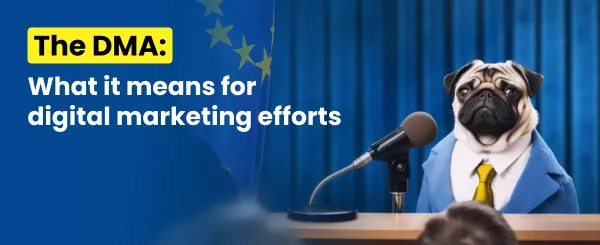The Digital Markets Act (DMA) is legislation designed to help the little guy by creating a space for fair competition and increased innovation. In the next six weeks, this next step in privacy regulation will begin to take effect in the European Union, with the rollout set for 7th March 2024.
“The idea is to curb the power of big players like Google, Apple, and Meta, and empower smaller actors in the digital sphere,” notes Cristiano Winckler, Head of Digital Operations at Somebody Digital. “For marketers, we’re going to have to consider the implications of these new privacy measures”.
What is the Digital Markets Act (DMA)?
The DMA is a set of regulations developed for the EU region and designed to equalise the digital economy by making it more fair and contestable. It does so through the identification of over 20 “gatekeepers” in the digital space: big players with a monopoly in certain spheres, including social media, messaging services, and search engines. These gatekeepers are then given a list of obligations and prohibitions, which, it is hoped, will level the playing field regarding digital business in the EU.
“This is an attempt to balance the scales,” notes Cristiano “In some instances, these ‘obligations’ will favour digital marketers, while in others, it will become harder to reach specific audiences.”
For example, Google in the EU will need to have an additional banner requesting a user’s consent to track them for business purposes, but Google will also have to provide this data to any businesses running campaigns on the platform, which was previously difficult to obtain.
“Digital marketers are continuously evolving to meet these kinds of challenges. We’ve recently experienced this with many of our healthcare clients and the rollout of HIPPA in the States,” notes Cristiano.
Here’s how the DMA might impact your digital marketing efforts going forward
For different agencies, the enforcement of these regulations may have several implications. In some cases, the DMA presents new opportunities, while for others, it may require reconsidering how work is done.
PPC Agency: “As I’ve mentioned, there will be more consent options for users on various platforms,” says Cristiano. “This means that targeting specific audiences and remarketing may become more challenging for those providing paid media services. At the same time, search engines are now obligated to provide data on campaigns businesses run on their platforms, which can help drive better advertising outcomes.
SEO Agencies: “The DMA is designed to create more equal competition. This means platforms like Google can no longer provide preferential results when a user is searching for flights or accommodation, for example,” he notes. This could help those providing an SEO service to help clients rank better on search results.
CRO Agency: “As you were, CROs” laughs Cristiano, though not quite. “It may take a little bit longer for these regulations to filter through to conversion optimization experts.“ The DMA provides for increased interoperability between different platforms and service providers. This means there’s no more exclusivity. For example, you could access Google Play on your iPhone. “CROs may need to rethink how users are landing on their sites, or where they are coming from as the user journey shifts with these changes.”
The DMA and the future of marketing agencies
“The point of digital marketing is agility,” notes Cristiano. These changes just present another chance for those working in the industry to shift and learn new ways to provide the same quality service. “It’s about considering the impact the DMA will have on what you do, and getting ahead of the curve sooner rather than later,” he concludes.
Need more help with your marketing efforts? Get in touch today.





















